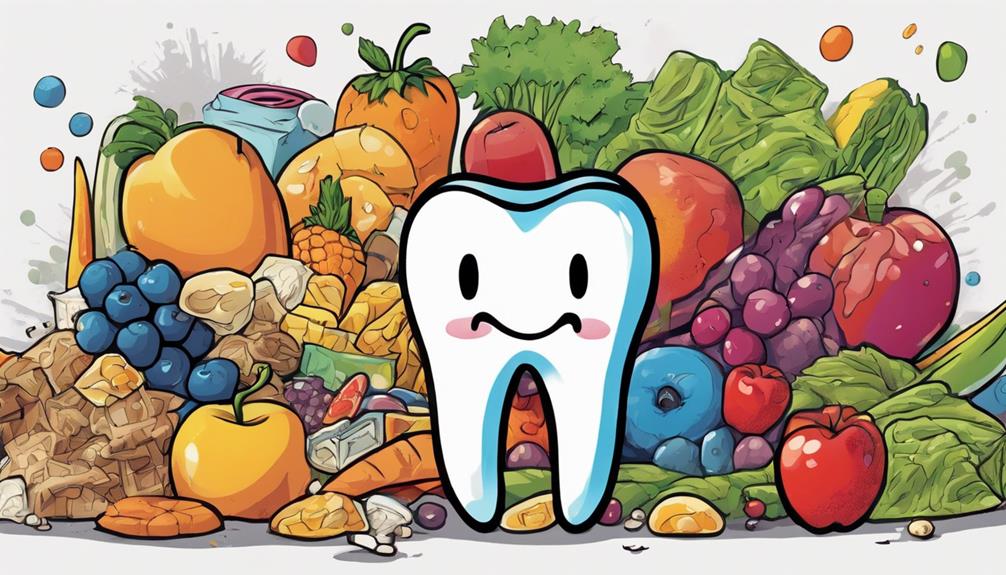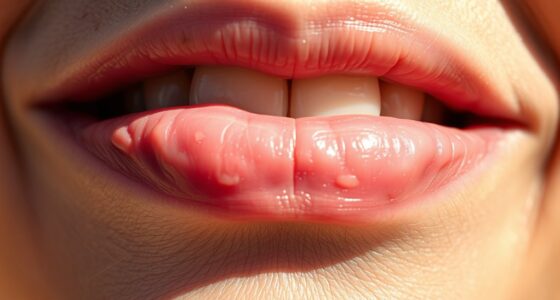You might be surprised by some dental health secrets your dentist doesn't always share. First, daily flossing is essential and can lower gum disease risk by up to 40%. When brushing, use a 45-degree angle and aim for three to five minutes for effective plaque removal. Choosing fluoride toothpaste is crucial for cavity prevention. Watch your diet; sugar and acidity can harm your enamel. Regular check-ups are necessary to catch issues early. Finally, be cautious with aggressive brushing, as it can do more harm than good. There's so much more to uncover about maintaining that perfect smile.
Key Takeaways
- Daily flossing can reduce the risk of gum disease by up to 40%, yet many neglect this essential practice.
- Proper brushing techniques, such as a 45-degree angle, can prevent enamel damage and gum irritation.
- Tongue cleaning is crucial for eliminating bacteria and preventing bad breath, yet often overlooked in oral hygiene routines.
- Regular dental check-ups are vital for early detection of issues, saving you time and money in the long run.
Importance of Daily Flossing

Daily flossing is essential for keeping your teeth and gums healthy by removing plaque and food particles that your toothbrush can't reach. When you skip this important step, you're increasing your risk of gum disease and tooth decay.
Flossing daily helps eliminate the buildup of plaque between your teeth, which can harden into tartar if neglected. Tartar can only be removed during professional cleanings, making regular flossing a cost-effective preventive measure.
Studies show that individuals who commit to daily flossing can reduce their risk of developing periodontal disease by up to 40%. This impressive statistic highlights just how significant this habit is for maintaining your oral hygiene.
In addition to benefiting your gums, flossing contributes to fresher breath by removing food debris and bacteria that can cause bad breath.
The American Dental Association recommends that you incorporate flossing into your daily routine, ideally before brushing your teeth. Doing so maximizes the effectiveness of both practices and keeps your mouth healthy.
Choosing the Right Toothpaste

When you're choosing toothpaste, it's essential to take into account what your teeth need most.
Fluoride can be a game-changer for preventing cavities, while options for sensitivity and whitening can address specific concerns.
Always read the labels to guarantee you're picking a safe and effective product for your dental health.
Fluoride Benefits Explained
Fluoride plays an important role in strengthening your tooth enamel and reducing cavity risk, making it a key ingredient to look for in toothpaste. When you choose a toothpaste, prioritize those that contain fluoride, as it effectively combats tooth decay. The American Dental Association (ADA) recommends fluoride for maintaining ideal dental health, especially for individuals at higher risk of cavities.
While some toothpaste options claim to be fluoride-free, they may not provide the same level of protection against tooth decay. Always check for the ADA Seal of Acceptance on your toothpaste, which indicates it meets stringent efficacy and safety standards.
As you navigate your choices, be cautious of specialized formulas, like those for sensitive teeth or whitening. It's essential to verify they still contain fluoride, as this ingredient is imperative for maintaining strong tooth enamel.
However, remember that excessive fluoride exposure can lead to dental fluorosis, particularly in children. Always follow recommended usage guidelines to avoid this risk.
Sensitivity and Whitening Options
Choosing the right toothpaste can make a significant difference, especially if you're dealing with sensitivity or looking to enhance your smile with whitening effects.
If you have sensitive teeth, opt for toothpaste specifically formulated for sensitivity. These often contain potassium nitrate or strontium chloride to help reduce discomfort.
When it comes to whitening, be cautious. Many whitening toothpastes use abrasive ingredients or bleaching agents, which can erode your enamel if used excessively. It's important to follow the instructions and consult your dentist for professional whitening options that prioritize your dental health.
For those wanting a two-in-one solution, some brands now offer dual-action toothpastes designed to whiten your teeth while minimizing sensitivity. This can provide a balanced approach to your dental care routine.
Always check for fluoride content, as it's crucial for strengthening enamel and preventing cavities.
To make sure you're choosing a safe and effective product, look for the ADA Seal of Acceptance on the packaging. This seal guarantees that the toothpaste meets high standards for safety and efficacy, giving you peace of mind in your dental care choices.
Reading Labels Effectively
Understanding how to read toothpaste labels can help you make informed decisions that prioritize your dental health. Here are some key factors to take into account when choosing the right toothpaste:
- ADA Seal of Acceptance: Look for this seal, as it indicates the toothpaste has been tested for safety and effectiveness.
- Fluoride Content: Make sure your toothpaste contains fluoride. This ingredient is essential for strengthening tooth enamel and preventing decay.
- Sensitive Teeth: If you experience discomfort, select toothpaste specifically designed for sensitive teeth. These often contain potassium nitrate or strontium chloride to help alleviate pain.
- Whitening Agents: For those aiming for a brighter smile, choose toothpaste with whitening agents like hydrogen peroxide. They effectively remove surface stains without harming enamel.
Be cautious with natural toothpastes or those labeled as non-fluoride. While they may seem appealing, they mightn't provide adequate protection against decay.
Effective Brushing Techniques

To keep your smile healthy, mastering effective brushing techniques is key.
You should aim for the right angle, brush for a full three to five minutes, and don't forget to clean your tongue for fresher breath.
These simple adjustments can make a big difference in your oral hygiene routine.
Proper Angle Matters
Holding your toothbrush at a 45-degree angle to the gum line guarantees that the bristles effectively reach both your teeth and gums for a thorough clean. This proper angle is essential for maintaining good oral care and preventing gum disease.
To maximize your brushing technique, follow these tips:
- Use Short, Gentle Strokes: Avoid aggressive brushing, as it can harm your enamel and irritate your gums.
- Focus on All Quadrants: Divide your mouth into four quadrants and spend equal time on each. This guarantees extensive plaque removal.
- Replace Your Toothbrush Regularly: Change your toothbrush every three to four months, or sooner if the bristles are frayed, to maintain prime cleaning performance.
- Don't Forget Your Tongue: Incorporating tongue brushing into your routine helps eliminate bacteria and freshens your breath, contributing to better oral hygiene.
Duration of Brushing
Brushing your teeth for the right amount of time is just as important as the angle and technique you use, ensuring you effectively remove plaque and maintain oral health. Aim for a brushing duration of three to five minutes. Research shows that brushing for at least four minutes considerably reduces plaque buildup compared to shorter sessions.
To achieve this, focus on using a proper brushing technique. Use short, gentle strokes at a 45-degree angle to your gums. This approach not only helps clear away plaque but also protects your enamel and prevents gum irritation.
Don't forget about thorough brushing! Make sure you clean all areas of your mouth, especially the back teeth, where plaque tends to accumulate. Regularly including these areas in your routine will contribute to healthier gums and overall oral hygiene.
It's essential to develop a consistent habit of brushing for the recommended duration. Set reminders if needed, as this simple action can drastically improve your dental health and reduce the risk of cavities and gum disease. Prioritize your brushing duration, and your smile will thank you!
Tongue Cleaning Importance
Cleaning your tongue daily is essential for eliminating bacteria and food particles that cause bad breath and can impact your overall oral health. A clean tongue plays a notable role in your oral hygiene and can help prevent serious issues like periodontal disease.
Here's how to effectively incorporate tongue cleaning into your oral care routine:
- Choose the Right Tool: Use a tongue scraper or a dedicated toothbrush designed for tongue cleaning. These tools can effectively reduce the buildup of bacteria.
- Be Gentle: Apply light pressure when cleaning your tongue. Too much force can irritate the surface, leading to discomfort.
- Timing is Key: Integrate tongue cleaning into your routine right after brushing your teeth for maximum freshness and oral hygiene benefits.
- Daily Practice: Make it a habit to clean your tongue every day. This consistency will considerably improve your breath and reduce harmful bacteria.
Necessity of Regular Check-Ups

Regular check-ups are vital for maintaining your dental health and catching potential issues before they turn into costly problems.
Visiting your dentist every six months allows for early detection of dental issues, which can save you both time and money in the long run. Many people unknowingly suffer from gum disease, but consistent visits help monitor your gum health and overall oral wellness.
During these check-ups, professional cleanings remove tartar buildup that regular brushing and flossing can't eliminate. This reduction in tartar decreases your risk of cavities and gum disease, ensuring your smile stays bright and healthy.
In addition, research shows that regular preventive care can address issues before they escalate into more severe conditions, making it imperative to prioritize your dental visits.
Your dentist can also identify systemic health issues, such as diabetes or heart disease, through observations made during routine examinations. This highlights the holistic importance of regular dental check-ups, as they contribute not only to your oral health but also to your overall well-being.
Don't wait for problems to arise; schedule those check-ups and invest in your health today!
Impact of Diet on Teeth

Your diet plays a crucial role in the health of your teeth, influencing everything from decay to enamel strength. To maintain ideal oral health, consider these key dietary factors:
- Limit your sugar intake: High sugar consumption feeds harmful bacteria that produce acid, leading to tooth decay and cavities.
- Watch out for starchy foods: Foods like pasta and chips can also elevate acid levels in your mouth, increasing the risk of cavities.
- Be cautious with acidic foods: Citrus fruits and soda can erode your tooth enamel, so it's wise to limit these items in your diet.
- Incorporate calcium-rich foods: Dairy products like milk and cheese help strengthen your teeth and bones, promoting better oral health.
Additionally, don't forget the importance of drinking fluoridated water. It helps wash away food particles and bacteria while providing essential fluoride that strengthens enamel.
Understanding Teeth Whitening Limitations

Teeth whitening treatments can markedly enhance your smile, but it's important to understand their limitations to manage your expectations effectively.
While professional whitening often provides longer-lasting results than over-the-counter options, they aren't permanent. Regular consumption of staining foods like coffee, tea, and red wine can cause discoloration to return faster than you might expect.
Moreover, some whitening procedures can strip enamel, which may lead to increased sensitivity or even long-term damage if not carefully monitored. The effectiveness of the treatment can also vary based on your teeth's natural color and condition; certain stains are more resistant to whitening than others.
To prolong the effects of teeth whitening, focus on good oral hygiene and a balanced diet. Regular brushing, flossing, and dental check-ups can help you maintain brightness and reduce the risk of further staining.
Causes of Persistent Bad Breath

If you're struggling with persistent bad breath, it's vital to reflect on several key factors.
Your oral hygiene habits, the foods you eat, and any underlying health conditions can all play a significant role.
Let's explore how these elements contribute to halitosis and what you can do about it.
Oral Hygiene Practices
Poor oral hygiene practices often lead to persistent bad breath by allowing bacteria to thrive and produce unpleasant odors in the mouth. To combat this, you need to focus on effective oral hygiene routines that protect your teeth and gums.
Here are four essential practices to help you maintain fresh breath:
- Brush Twice Daily: Make sure to brush your teeth for at least two minutes each time. This removes food particles and plaque that can cause bad breath.
- Floss Daily: Flossing is vital for cleaning between your teeth where your toothbrush can't reach. This helps prevent gum disease and reduces bad breath.
- Stay Hydrated: Drink plenty of water to combat dry mouth, which can lead to increased bacteria in your mouth.
- Regular Dental Check-ups: Schedule dental check-ups every six months. Your dentist can identify any problems, such as gum disease or tooth decay, that may be contributing to your bad breath.
Dietary Influences
Your diet plays a considerable role in the development of persistent bad breath, as certain foods can encourage bacterial growth and lead to unpleasant odors in your mouth.
Foods high in sugar and starches are particularly troublesome, promoting bacteria that produce foul-smelling compounds. Acidic foods and drinks, like citrus fruits and soda, can erode your tooth enamel and create an environment that fosters bacterial growth, worsening your bad breath.
Additionally, beverages such as coffee and alcohol can lead to dry mouth, reducing saliva flow. Saliva is essential for washing away food particles and bacteria, so a lack of it can contribute to persistent odors. You might also want to be cautious with garlic and onions, as their sulfur compounds can linger in your mouth and bloodstream, even if your oral hygiene is on point.
To combat bad breath, stay hydrated and incorporate alkaline foods like vegetables and nuts into your diet. These foods help neutralize acidity in your mouth, reducing the risk of bad breath and promoting overall oral health.
Health Conditions Impact
Persistent bad breath, often a sign of underlying health conditions, can stem from issues like gum disease, respiratory infections, and gastrointestinal problems.
If you're experiencing persistent bad breath, it's vital to take into account these potential health issues:
- Gum Disease: This can lead to an accumulation of bacteria, causing halitosis despite good oral hygiene.
- Dry Mouth: Conditions like diabetes can decrease saliva production, reducing your mouth's natural cleansing ability.
- Chronic Sinus Infections: These often result in post-nasal drip, where mucus provides a fertile ground for bacteria.
- Liver or Kidney Diseases: When these organs aren't functioning well, they can cause distinct odors in your breath.
While maintaining proper oral hygiene is fundamental, persistent bad breath may indicate serious underlying health issues that need attention.
Don't hesitate to seek a consultation with your dentist or healthcare provider to rule out any complications.
Remember, addressing these health issues not only helps with bad breath but also improves your overall well-being.
Take action now to guarantee your mouth—and body—are as healthy as they can be!
Risks of Over-Brushing

Over-brushing can wear down enamel and irritate gums, leading to serious dental problems. Many people believe that more brushing means better dental health, but aggressive brushing can actually do more harm than good.
When you brush too hard or too often, you risk enamel damage, which can increase tooth sensitivity and make you more susceptible to cavities. The American Dental Association advises against over-brushing, defining it as brushing more than three times a day or using excessive pressure.
Gum recession is another consequence of over-brushing. This condition occurs when gums pull away from the teeth, potentially exposing sensitive root surfaces and leading to further issues.
Toothbrush abrasion, a type of wear caused by aggressive brushing techniques, can permanently damage your enamel, leaving your teeth vulnerable.
To maintain ideal oral health, focus on gentle brushing techniques using a soft-bristled toothbrush. Aim to brush for two minutes twice daily, emphasizing technique rather than force. By being mindful of your brushing habits, you can protect your enamel and gums, ensuring a healthier smile for years to come.
Connection Between Oral and Overall Health

Recognizing the link between oral health and overall well-being is essential, as issues like gum disease can trigger serious systemic conditions, including heart disease and diabetes. When you experience poor oral health, the inflammation in your mouth can notably impact your body.
Here are some key points to reflect on:
- Bacteria Risks: Oral bacteria from gum disease can enter your bloodstream, leading to cardiovascular problems.
- Oral Symptoms: Persistent issues, like bleeding gums, might signal underlying health problems, such as diabetes.
- Regular Check-ups: Dental check-ups help catch dental issues early and allow dentists to identify signs of systemic diseases based on oral health indicators.
- Preventive Care: Effective management of oral health through proper hygiene and regular visits can reduce your risk of developing chronic systemic conditions.
Benefits of Improving Your Dental Care

Improving your dental care can lead to significant benefits, including a healthier mouth, stronger teeth, and a lower risk of serious health issues. Many people underestimate the importance of regular dental care, but maintaining good oral hygiene is essential. Simple steps, like brushing with fluoride toothpaste and flossing daily, can reduce the risk of gum disease by up to 60%.
Here's how improving your dental care can benefit you:
| Benefit | Details | Impact on Systemic Health |
|---|---|---|
| Healthier Mouth | Reduces risk of gum disease and tooth decay | Lowers risk of heart disease |
| Stronger Teeth | Enhances tooth enamel strength | May prevent diabetes complications |
| Fewer Dental Visits | Professional cleanings remove tartar | Contributes to overall wellness |
Frequently Asked Questions
How Do You Tell if Dentist Is Scamming You?
To tell if your dentist's scamming you, watch for unnecessary upselling, vague explanations, or pressure for immediate decisions. Always seek a second opinion, research their credibility, and trust your instincts about their recommendations. In addition to seeking a second opinion and researching their credibility, it’s important to also consider the impact of their dental health recommendations on your overall well-being. If something feels off or too good to be true, don’t hesitate to get a second opinion from another trusted health professional. Your dental health is important, so don’t be afraid to advocate for yourself and your well-being. Trusting your instincts and being proactive in seeking reliable advice can help you make the best decisions for your dental health.
What Not to Say to Your Dentist?
When talking to your dentist, don't underestimate brushing time, oversimplify your diet, or downplay flossing. Mention any discomfort you feel, even if it seems minor, and be honest about your dental anxiety for better care.
Do Dentists Judge You for Having Bad Teeth?
Dentists don't judge you for having bad teeth. They focus on understanding your unique situation and providing solutions. Open communication helps them create a comfortable environment, ensuring you receive the care you need without fear.
What Is the Secret to Dental Health?
Think of your mouth as a garden; nourish it with proper brushing, daily flossing, and regular check-ups. It flourishes with a balanced diet and hydration, keeping decay at bay while ensuring vibrant, healthy smiles.
What Are Some Dental Health Secrets That Can Improve My Teeth Brushing Technique?
Are you showing any brushing teeth wrong signs? To improve your teeth brushing technique, try using a soft-bristled toothbrush and gentle, circular motions. Don’t forget to brush for at least two minutes and to clean your tongue as well. And of course, regular dental check-ups are essential for maintaining good oral health.
Conclusion
Taking care of your dental health is essential for a vibrant smile and overall well-being.
Did you know that nearly 50% of adults over 30 have some form of gum disease? That's a staggering number!
By following these secrets, you're not just preventing cavities and bad breath; you're investing in your health.
So, prioritize daily flossing, choose the right toothpaste, and don't skip those check-ups.
Your teeth—and your body—will thank you for it!









